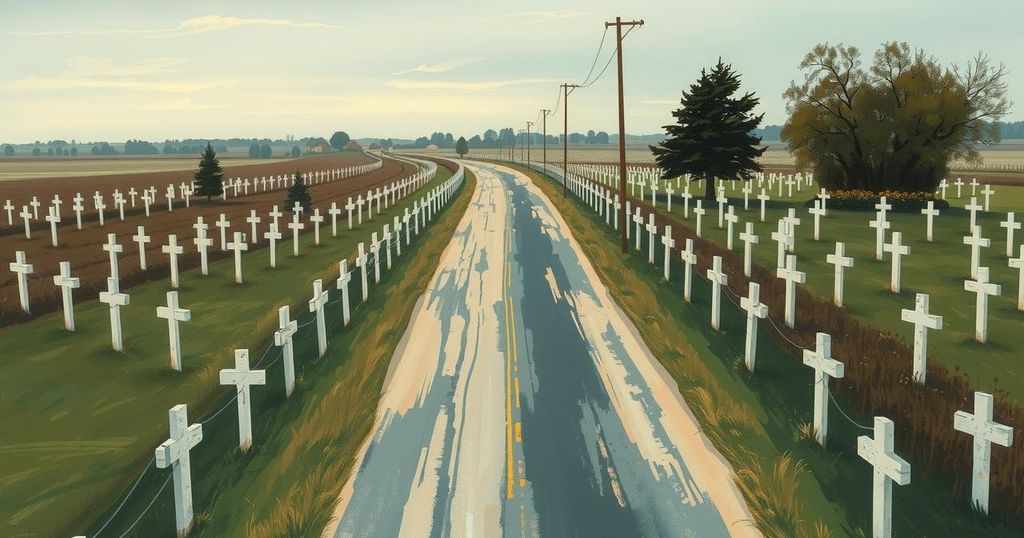South Africa’s Police Minister Refutes Trump’s Claims of Farmer Genocide
South Africa’s Police Minister has criticized U.S. President Trump for misrepresenting a video regarding memorial crosses, claiming they falsely depict burial sites for white farmers. He emphasized the crosses are temporary memorials for all farmers. Mchunu dispelled the genocide allegations made by Trump, stating that they stem from misinformation. The South African government denies claims of systemic violence against white farmers and seeks to correct misconceptions in international dialogue.
JOHANNESBURG — In a sharp response to U.S. President Donald Trump, South Africa’s Police Minister Senzo Mchunu asserted on Friday that Trump distorted facts to promote baseless allegations of genocide against white farmers in the country. During a recent meeting in the Oval Office, Trump showcased a video claiming it depicted burial sites for over 1,000 white farmers, misconstruing the context of the footage, according to Mchunu.
The video, which played during the meeting with South African President Cyril Ramaphosa, depicted a rural road flanked by white crosses, prompting Trump to remark, “These are burial sites, right here. Burial sites, over a thousand, of white farmers…” However, Mchunu emphasized that these crosses did not signify graves; they were part of a temporary memorial put up during a funeral procession in 2020 for a couple murdered during a robbery on their farm.
Mchunu explained that the memorial aimed to protest the killing of farmers regardless of their race, not to represent the deaths of white farmers alone. He noted that these memorial crosses were removed shortly after the funeral rites. Making a broader point, the minister stressed that, while violent crime—farmed-related or otherwise—remains a significant issue in South Africa, the statistics regarding farm killings reveal they constitute a small portion of overall homicides.
He highlighted the complexities surrounding race in discussions about crime in South Africa. With white individuals making up about 7% of the population, they often maintain a higher standard of living compared to the Black majority many years after the end of apartheid. Nevertheless, the narrative that white farmers are systematically targeted has drawn widespread rebuke from the South African government.
“They are not graves. They don’t represent graves,” Mchunu remarked regarding the viral video that has circulated on social media since the Oval Office meeting. He continued to condemn Trump’s claims as harmful misinformation, calling it an unfortunate twisting of facts to suit a misleading narrative about South Africa’s crime situation. He further remarked, “We have respect for the president of the United States, but we have no respect for his genocide story whatsoever.”
In the wake of the meeting, claims regarding the supposed genocide against white farmers in South Africa have been emphatically denied by government officials, who argue that these assertions stem from a broader misunderstanding or misrepresentation of reality. Despite the controversy, the White House has yet to respond publicly to Minister Mchunu’s statements.
According to Mchunu, out of more than 5,700 homicides in South Africa between January and March of this year, only six occurred on farms, and only one of the victims was white. He underscored the importance of context, saying, “In principle, we do not categorize people by race, but in the context of claims of genocide of white people, we need to unpack the killings in this category.”
Lourens Bosman, a former member of Parliament, also participated in the original funeral procession shown in Trump’s video. He defined the crosses as symbols honoring both white and Black farmers and farmworkers felled by violence in South Africa over the years. Meanwhile, President Ramaphosa’s recent meeting with Trump was perceived as crucial to correct misconceptions concerning South Africa and to mend diplomatic relations strained by previous events.
This ongoing narrative has had real consequences as Trump has enacted policies, such as an executive order on February 7 of this year, aimed at cutting U.S. financial assistance to South Africa based on accusations of land seizures and mistreatment of white farmers. South Africa’s government continues to assert that these claims are unfounded, advocating for a clearer understanding of the country’s social dynamics and crime issues against a backdrop of historical tension.
In conclusion, South Africa’s Police Minister Senzo Mchunu has publicly denounced U.S. President Donald Trump’s claims about genocide against white farmers in South Africa, insisting that Trump’s portrayal of a memorial video is distorted and misleading. This evolving controversy underscores the challenges of accurately discussing race, crime, and socioeconomic disparities in post-apartheid South Africa, where complex societal dynamics continue to shape perceptions both locally and internationally. The South African government remains resolute in its denials of the genocide narrative as it seeks to clarify its position in global conversations about land and farmer safety.
Original Source: apnews.com




Post Comment